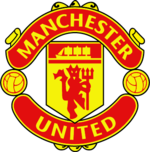After the Treble (1999-present)

United won the league in 2000 and 2001 but the press saw these seasons as failures as they failed to regain the European Cup. Ferguson adopted more defensive tactics to make United harder to beat in Europe but it was not a success and United finished the season in third place in 2002.
They regained the league the following season (2002-03) and started the following season well, but their form dropped significantly when Rio Ferdinand received a controversial eight month suspension for missing a drugs test. They did win the 2004 FA Cup, however, knocking out Arsenal (that season's eventual champions) on their way to the final in which they beat Millwall.
The 2004-05 season was characterised by a failure to score goals, mainly due to the injury of striker Ruud van Nistelrooy and United finished the season trophyless and in third place in the league. This time, even the "consolation prize" of the FA Cup eluded them as Arsenal beat United on penalties after a goalless draw after 120 minutes. Off the pitch, the main story was the possibility of the club being taken over and at the end of the season, Tampa businessman Malcolm Glazer, (who also owns the American football team Tampa Bay Buccaneers), acquired a controlling interest in the club.
United made a poor start to the 2005-06 season, with midfielder Roy Keane leaving the club to join Celtic after publicly criticising several of his teammates, and the club failed to qualify for the knock-out phase of the UEFA Champions League for the first time in over a decade after losing to Portuguese team SL Benfica. Their season was also dealt cruel blows with injuries to key players such as Gabriel Heinze, Alan Smith, Ryan Giggs and Paul Scholes.
However, they were prevented from being left empty handed in successive seasons - a disappointment not endured in the last 17 years - by winning the 2006 League Cup beating newly promoted neighbours Wigan Athletic in the final 4-0. United also ensured a second-place finish and automatic Champions League qualification on the final day of the season by defeating Charlton Athletic 4-0.
At the end of the 2005-2006 season, one of United's key strikers, Ruud van Nistelrooy, left the club to join Real Madrid, due to a row with Alex Ferguson.[8] Early in January 2007, Manchester United signed Henrik Larsson on loan, who scored his first goal against Aston Villa in their 2-1 win in the FA Cup at Old Trafford.






